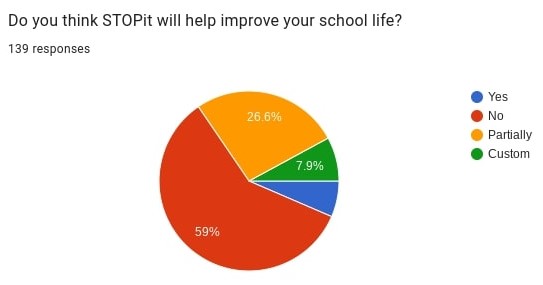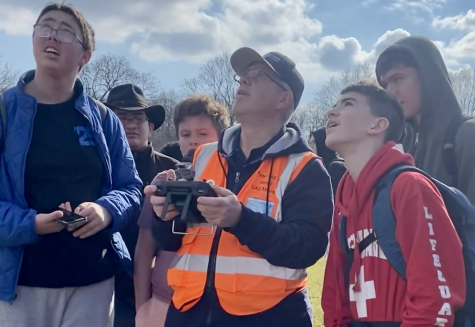Launch of Anti-Bullying STOPit Draws Mixed Reviews

A random poll by The Streak of 139 Warren Hills students showed that a majority of students believe that the STOPit app would not improve their school lives. Blue for ‘Yes’, Red for ‘No’, Yellow for ‘Partially’ and Green for ‘Custom’. (Graph by Priscilla Lucci and Autumn Templin)
Warren Hills administrators have announced plans to employ an electronic app, STOPit, that will enable individual users to submit anonymous tips about bullying, threats of violence, and other inappropriate behaviors.
Students attended the presentations about STOPit, during three lunch periods in the auditorium on Feb. 17. STOPit, which is being used in other districts throughout the nation, reportedly has been successful in identifying safety problems. The app can be downloaded off the internet for free.
According to students who attended the Lunch One assembly, there was supposed to be a video showing features of the app, but because questions arose from the audience, Principal Christopher Kavcak and Assistant Principal Glenn Barker stopped the video to answer questions.
Questions during Lunch Three ranged from students asking if they could get paid to submit tips to students, to openly wondering what might happen if people submitted fake tips on the app.
While school officials generally prefer that students and staff report issues in person, because it is easier to follow up and make sure real issues are dealt with, STOPit’s main purpose is to help students who are less inclined to report bullying and/or harassment due to fear and a desire not to have their names attached to a complaint.
Several students at the three lunchtime presentations claimed in the past they had reported concerns to administrators, but no action was taken. They questioned if non-action would continue if they made similar reports over the app.
“After I was screamed at and called a ‘f—-t’ in the hallways and told a teacher, I was urged to come forward,” said sophomore Milen Palacios. “After reporting the issue to administration, no action was taken. I don’t see why reporting anonymously through a screen would help.”
Two recurring themes from student statements were that students felt administrative action was rarely taken or that they were not taken seriously.
Two days after the Feb. 17 assemblies, Kavcak wrote in an email message to high school teachers that administrators learned a great deal from student comments in the auditorium.
“Our plan for training the students was to show them a video about the system, but the assembly turned more into a discussion, giving students the opportunity to voice concerns and feedback to the administration,” Kavcak wrote. “Through this feedback, we gained some insights into the concerns our students have.”
In a poll by The Streak asking close to 140 anonymous students how they felt about STOPit, an overwhelming majority said they did not feel the app would improve their lives.





